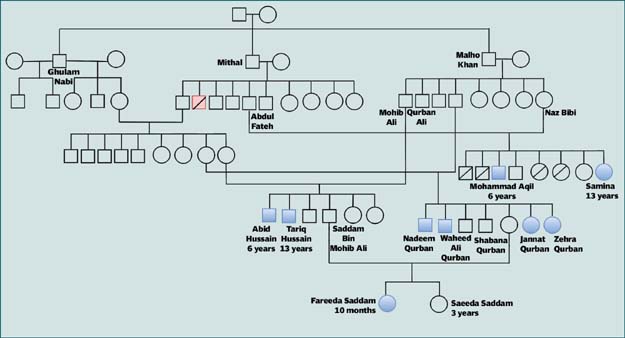Genetic disorders: The heavy price of cousin marriages
Rare genetic disease attributed to intra-family marriages caused disability in 16 children of the same family

PHOTO: FILE
The cases sparked concerns among healthcare professionals and it was subsequently discovered that the disabilities occurred because of a unique genetic neuromuscular disease. The reason: inter-family marriages.
Given the rarity of the unnamed disease, Sindh Health and Population Welfare Minister Dr Azra Fazal Pechuho took notice and recommended a full-fledged scientific investigation into the matter. Scientists from the Jamilur Rahman Center for Genome Research (JRCGR) - which functions under the International Centre for Chemical and Biological Sciences (ICCBS) at University of Karachi - consequently started formal research to probe the disease.
"The initial investigation showed that the rare genetic disease was caused by successive cousin marriages within the family," informed Dr Ishtiaq Ahmed Khan, lab head at the Jamilur Rahman Centre for Genome.
Secret to a happy married life is in your genes: study
And as the disease inflicted members of a single family in Nawabshah, with no reports from other parts of Sindh or the country at large, Pakistani medical researchers claimed that the genetic disorder has hardly ever been reported in any part of South Asia before.
The research team visited the family in Nawabshah to collect blood and DNA samples from both the healthy and the affected family members and also collected data on family history, its genealogy, disease symptoms and their progression, as well as causes of death of the deceased members of the affected family.
"We discovered that three brothers from the family - Qurban, Haji Mohib Ali and Abdul Fateh - as well as a common nephew, had married their cousins. Also, the affected family became superstitious because all the children were born healthy and developed the disability later," said Dr Muhammad Irfan and Maleeha Khan, two medical researchers working under Dr Khan.

The afflicted children - all of whom were bedridden because of mental and physical disabilities - were aged below 18, with the youngest child only aged four.
The first symptoms of the disease - including nausea and vomiting - started occurring after a few years of birth, typically at age three or four. A few weeks later, the affected children started developing various types of infections due to compromised immunity. The disease also caused febrile seizures leading to progressive fevers and involuntary release of spit from the mouth.
Doctors also found out that the symptoms of the disease gradually disappeared, but the disease itself continued to worsen internally without apparent signs, leading to paralysis and twisted or deformed limbs. And because the victims started showing delayed developmental milestones - including delay in learning language, thinking, and motor skills milestones - the condition became untreatable.
Dr Khan further added that in order to ascertain any other cause of the disease, a chemical examination of water samples obtained from the residential area of the victims was also carried out to discover the presence of any microbial infection or heavy metal toxicity. The tests, however, ruled out the role of environmental factors on the ground that consumption from the same water reservoirs had not affected anyone else in the neighbourhood.
Speaking to Daily Express, Dr Iqbal Chaudhry, the chairman of ICCBS, explained that parents pass on their genes or genetic material to their offspring through the process of reproduction.
"The disease does not develop in babies if only one parent carries the faulty gene," Dr Chaudhry detailed. "Therefore, the chances of carrying the disease through genes are considerably reduced if marriages do not take place within the families, as individuals carrying the same genes are more prone to having babies with birth defects."
MARK3, gene responsible for mysterious blindness, discovered in Pakistan
Dr Chaudhry further expounded that the affected family in Nawabshah continued to hold inter-family marriages for generations which led to the development of the disease.
"Unfortunately, medical science has not been able to find a cure for the disease. therefore, the government must provide support to the family in all possible ways," Dr Chaudhry maintained.
Citing the example of Iran, Dr Chaudhry explained that the Iranian government has strict laws in place that forbid cousin marriages, which has drastically reduced the incidence of genetically-borne diseases.
"To ensure permanent protection from the disease, authorities should pass legislation against cousin marriages in Pakistan and strictly implement the law," he suggested.
Published in The Express Tribune, February 16th, 2019.



















COMMENTS
Comments are moderated and generally will be posted if they are on-topic and not abusive.
For more information, please see our Comments FAQ